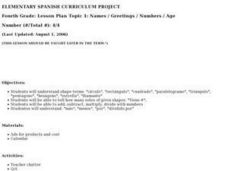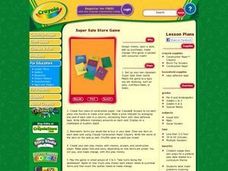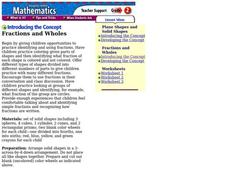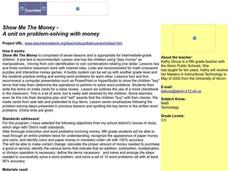PricewaterhouseCoopers
Credit and Debt: Decisions, Decisions...
Borrowing money seems like a great idea until you are in over your head. High schoolers learn the benefits and risks associated with credit and how to be a responsible borrower. More than just credit cards, they learn trustworthiness is...
Curated OER
Coins: Names and Value
Students read the story Benny's Pennies and play a matching game where they match the coin to it's value. In this coins lesson plan, students use the SMART Board to view coins.
Curated OER
Multiplying Money
Fourth graders use movie ticket prices and zoo admission prices to practice multiplying money amounts. In this money multiplication lesson, 4th graders use the Internet to find admission prices for amusement prices and movies. Students...
Curated OER
Money and Math
Not only will your young Spanish speakers develop shopping/ money vocabulary, they'll practice basic math as well! This plan will take no longer than 10-15 minutes and just has learners look at different products and do simple math. If...
Curated OER
Money, Commercial Banking, and Interest
Stdents explore the operation of the commercial banking system and the mechanics of money creation through the lending process. They investigate various interest rates to develop the relationship between interest rates and risk and...
Curated OER
Revolutionary Money
Examine paper money from the American revolution! Historians study the paper bills and discuss the history of money. How has money changed over the times? Activities are included.
Curated OER
Tell Me; I’ll Listen
Encourage respect, responsibility, and caring within your classroom with a collection of lessons that spark dialogue and self reflection. To address character traits, lessons touch on topics such as staying safe in the cafeteria,...
Curated OER
Nickel/Penny Grab
First graders examine the coins nickels and pennies. In this math lesson, 1st graders compare the value of the two sets of coins and determine their value. Additionally, students explore counting sets of coins that have pennies and...
Curated OER
Count On It!
Students investigate money. In this consumer math lesson, students use coins, identify their value, then group them in various ways to equal a dollar.
EngageNY
Writing and Graphing Inequalities in Real-World Problems
Inequalities: when one solution just doesn't suffice. Individuals learn to write inequalities in real-world contexts and graph solution sets on the number line. All inequalities in the lesson are of the form x < c or x < c.
Visa
Earning Money
Where does money come from? Is it limitless and always available? Introduce your youngsters to the concept of earning through jobs and/or chores with a matching activity and provided worksheets.
EngageNY
From Ratios to Rates
Rate ratios with unit rates and rate units. Pupils take ratios and determine their associated rates and unit rates. The scholars identify the different aspects of rates, the unit rate, and the rate unit. The lesson is the 16th in a...
EngageNY
Informally Fitting a Line
Discover how trend lines can be useful in understanding relationships between variables with a lesson that covers how to informally fit a trend line to model a relationship given in a scatter plot. Scholars use the trend line to make...
Federal Reserve Bank
Expense Tracking
Where does all your money go? Individuals keep a record of the money they spend over the course of 30 days. They then categorize where they are spending their money and write an essay detailing their findings.
Visa
Dream Big: Money and Goals
Whether their objective is independent living, going to college, or buying a car, pupils will participate in discussions and complete worksheets to gain an understanding of how short- and long-term goals play a large role in helping...
EngageNY
The Mathematics Behind a Structured Savings Plan
Make your money work for you. Future economists learn how to apply sigma notation and how to calculate the sum of a finite geometric series. The skill is essential in determining the future value of a structured savings plan with...
Curated OER
Budget Mania
Students examine several examples of budgets to develop a facility with the components of its formation. Income, expenses, and expenditures are considered and itemized for this instructional activity.
Curated OER
Super Sale Store Game
Students help their teacher set up their classroom in the form of a store. Using construction paper, they make different amounts of paper money and items to buy. To end the lesson, they play the game to practice making change and adding...
Curated OER
Fractions and Wholes
Lower elementary learners recognize solid shapes distributed for making fractions. Each individual uses a wheel and determine which part of a fraction is missing. This is a great lesson for your visual learners!
West Contra Costa Unified School District
Interest and the Number e
Mary, Mary, quite continuously, how does your money grow? Uses examples to examine the difference between simple interest and compound interest, and to take a look at different rates of compounding. Learners explore what would happen as...
Federal Reserve Bank
Creating a Budget
Learning to create and maintain a budget is an important life skill. Guide individuals in the discovery of their spending habits and how to track them. They then use what they learned to create a budget and make decisions on where they...
Curated OER
Show Me The Money
Students use "play money" as manipulatives, moving from coin identification to coin combinations totaling one dollar. They combine classroom work with Internet sites. Students use a buddy system to practice writing and solving word...
Curated OER
Sea and Learn - Lesson Plan: Dockyard Maties
Learners solve word problems involving money using all four operations listed, and convert pre-decimal currency into decimal currency. They discuss how dockyard mates were paid and the equivalence with today's money, and complete a...
Curated OER
Lesson 3: Where Does Money Come From?
Students listen to story Hundred Penny Box by Sharon Bell Mathis, explore history of money, and examine how money is produced in the United States. They discuss why money is used for exchange, and describe how money has changed over time.
Other popular searches
- Math Money Lessons
- Counting Money Math Lessons
- Autism Money Math Lessons
- Shopping Money Math Lessons
- Esl Lessons Maths Money
- Math Lessons With Money
- Math Lessons on Money
- Money Math Lessons for Life

























